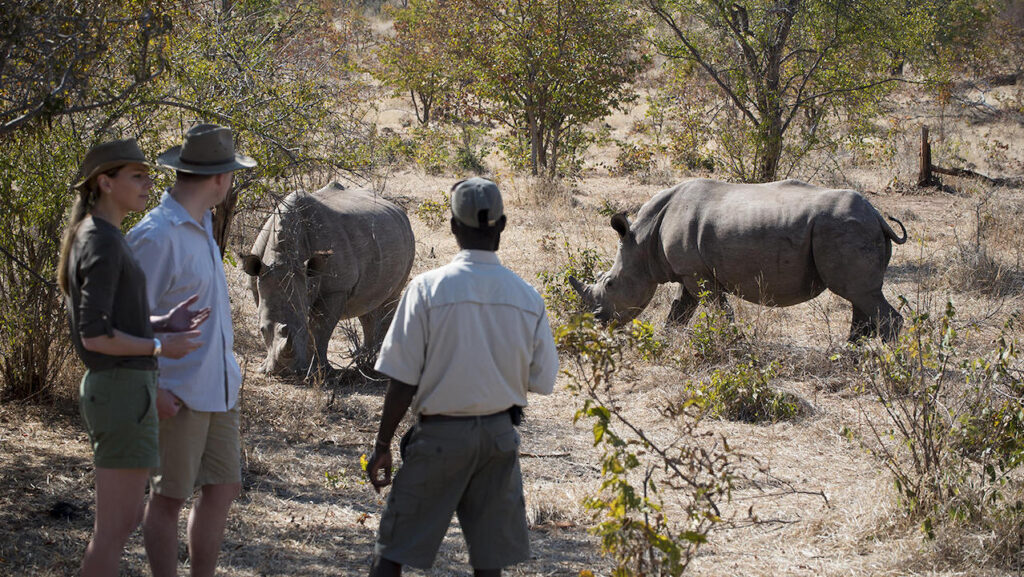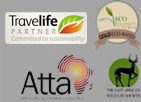
Image © Thorntree River Lodge, Zambia
Zambia is a wildlife haven for any safari enthusiast. It offers an authentic safari experience where visitors can explore rugged and wild landscapes with passionate and knowledgeable Guides. Our travel information section aims to provide you with useful information and resources for your safari holiday to Zambia.
- Contact us for more information or to discuss your travel plans with one of our dedicated travel consultants.
-
Getting There
Zambia’s main international airport is Kenneth Kaunda International Airport (LUN), located approximately 27 kilometres from Lusaka, the capital of Zambia.
There are no direct flights from UK or US into Zambia, most routes involve flying via South Africa into Johannesburg or via Middle East into Doha.
You can check your best flight route here
-
Time Zone
Time zone in Zambia (GMT+2)
-
Security & General Travel Safety
To view the current travel advisory to Zambia click here: UK & USA
Our head office is based in Nairobi and we work with reputable safari companies who are located on the ground in Zambia. These companies are the eyes and ears on the ground and can inform our head office in Nairobi of any security situation as it may happen, ensuring that we can act and respond swiftly.
Other general travel safety advice:
– In the cities and main tourist areas, be on the alert for handbag snatchers and pick pockets.
– Do not travel with any precious jewellery items.
– Make copies of your travel documents and keep these in a safe place – separate from the original documents.
-Split out cash into separate bundles of small amounts and keep separately.
– Ensure that luggage can be locked.
– Always wear sear belts whilst traveling in vehicles and ensure doors are locked.
-
Currency
The official currency of Zambia is the Zambian Kwacha (ZMK) although US$ is also widely used in many shops, hotels, lodges and restaurants that cater to travellers. However by law all payments within Zambia can only be made in kwachas, so you may receive change back in Kwachas.
Ensure to travel with lower denomination notes, as change given from high tender notes may not be easily available.
When tipping, do so in Kwachas.
Many camps/lodges will be pre-paid before your safari, with tips needing to be settled upon departure. If you do need to settle something to a bill, please be aware that some camps/lodges in remote areas may not accept credit/bank cards, so it is advised to have enough US$ or Kwachas in cash to cover any additional costs.
Always inform your bank that you are travelling outside of the country as they might block any attempt to withdraw cash or use card machines if they have not been informed beforehand.
-
Tips & Gratuities
Tipping is entirely at your discretion and although it is not a requirement it is customary to tip for good service. There is not a set amount to tip, so please take the following information as a guideline:
Guides – US$20 cash per person /per day
Camp Staff Team – US$10-$20 per person / per day
Camp Host – US$10-$20 per person / per dayTips should be given in US$ cash or Kwachas and it is usual to tip at the end of your stay.
Some camps/lodges will have a tip box for the camp staff team.
-
Health Information
Malaria:
It is advised that visitors take malaria precautions when travelling to Zambia. It is recommended that you contact your Doctor or Travel Health Clinic at least 6-8 weeks prior to travel.
You can reduce the risk of malaria by using prophylactics (which should be started before arriving in Zambia and under your doctor’s guidance) and by following these simple procedures:
– Wear long sleeves and long trousers to avoid bites from mosquitos, insects and ticks.
– Apply mosquito repellents on a regular basis to exposed skin.
– Where possible sleep under a mosquito net.
– Burn an insect/mosquito repellent candle or coil.
All travellers should be aware of the signs and symptoms of malaria and should be advised to seek immediate medical attention if these occur either whilst abroad or up to a year after their return. Speak to your Doctor or Travel Health Clinic for more information.
Vaccinations:
The recommendations regarding vaccinations & anti-malaria tablets need to be discussed with a professional, therefore it is advised that you contact your Doctor/medical centre/ travel health clinic for up-to-date details, this should ideally be done at least 8 weeks before you travel.
COVID-19:
There are currently no COVID-19 testing or vaccination requirements for travellers entering Zambia, but please check this before you travel.
For more information see the Centres for Disease Control and Prevention
-
Drinking Water & De-Hydration
- Drinking Water:
Bottled water is readily available, do not drink water straight from the tap, always drink from bottled water.
Also avoid ice as this may be used from tap water,
Brush teeth with bottled drinking water.
De-Hydration
Always take a bottle of drinking water in your day bag on any activity or excursions – even if it’s a short one – and take regular, small drinks of water.
Wear a hat and sunscreen at all times and cover up/take shade from the heat of the sun, especially during the hottest times of the day.
-
Bites & Stings
Bugs and small creatures are all a part of being in the wilds of Africa. It is of course important to take precautions against any opportunity for bites or stings, so being aware is important.
When walking in the bush always wear long trousers and enclosed shoes or walking boots , with thick socks covering the ankles for protection. When walking in long grass, check your legs and clothes for grass ticks – especially in the rainy season, even when you are wearing long trousers.
Check & shake out shoes and walking boots before putting them on.
Always look first to see where you are sitting, when picking something up or when putting your hand/foot into something, like a bag or shoe – check first!
If you think you may have been bitten or stung by something, always inform the Camp Manager & Safari Guide as soon as possible.
-
Internet, Electricity and Plug Standards
Internet availability and wifi can be sporadic whilst on safari in Zambia. It is best to think of this trip as an opportunity to take a break from the world of tech and reconnect to nature. If necessary, we can check each camp individually if there is a wish to know if it has an internet connection.
Zambia operates on a 230V supply voltage and 50Hz. Solar power and/or generators are also common in safari locations.
Zambia uses plug types C D and G.
-
Climate
Zambia has two specific seasons:
There is one main rainy season which happens from December – April. Some locations are not so easily accessed during these months and safari camps can be seasonally closed. Wildlife viewing can be challenging during this time, as wildlife tends to disperse and landscape can be lush and green.
The dry season occurs May – October, when the rains have finished and when safari viewing can be at it’s best but the temperatures are hotter. The hottest months tend to be September & October.
For viewing Victoria Falls, please be aware that November and December is when the water levels are at their lowest which means that there may be no water coming over the Falls on the Zambian side, this can be disappointing for visitors if they are expecting to experience the waterfalls. To view the falls in full water, consider visiting Feb-June.
-
Visa & Passport Requirements
PASSPORT
• Passport valid for a least 6 months from your date of entry.
• Return ticket to your country (or enough money to buy one).
• Sufficient funds to cover your stay in Zambia.
• Enough blank pages (a min of 3) in your passport to fit the required entry visa.VISA:
Check here for Nationals Who Do Not Require Visa
If you do require a Visa, we advise our clients to apply online for a visa in advance so that they have this before arrival. To check the latest Visa requirements and to apply for EVISA Service click here
-
Clothing Suggestions
Pack lightly for your safari to include:
– Comfortable, loose fitting cotton clothing in muted and natural tones is recommended.
– Long sleeves and long trousers, shorts and t-shorts with enclosed footwear.
– Jacket or fleece for early mornings and evenings, when it can get chilly.– Hat to keep the sun off and protect from sunburn.
– Small day pack to hold water bottle, binoculars, notebook and pen, sunglasses, face/hand wipes etc
– Please note that you should avoid camouflage-patterned clothes.
See here for our clothing packing guide
-
Travel Insurance
All travellers must have adequate and comprehensive travel health insurance. Make sure your travel insurance covers all the activities you plan on doing in Zambia and covers your full stay in the country and travel to/from.
-
Getting There



